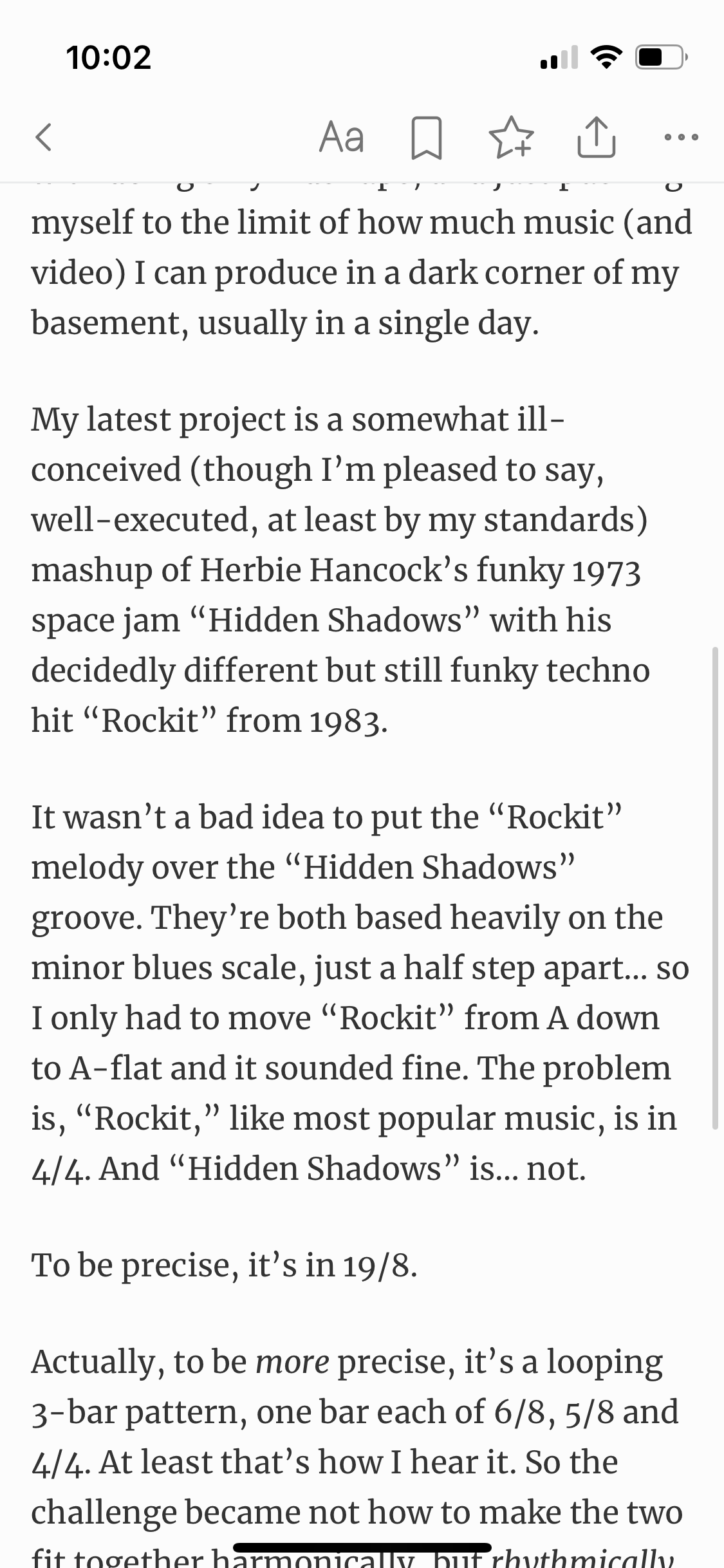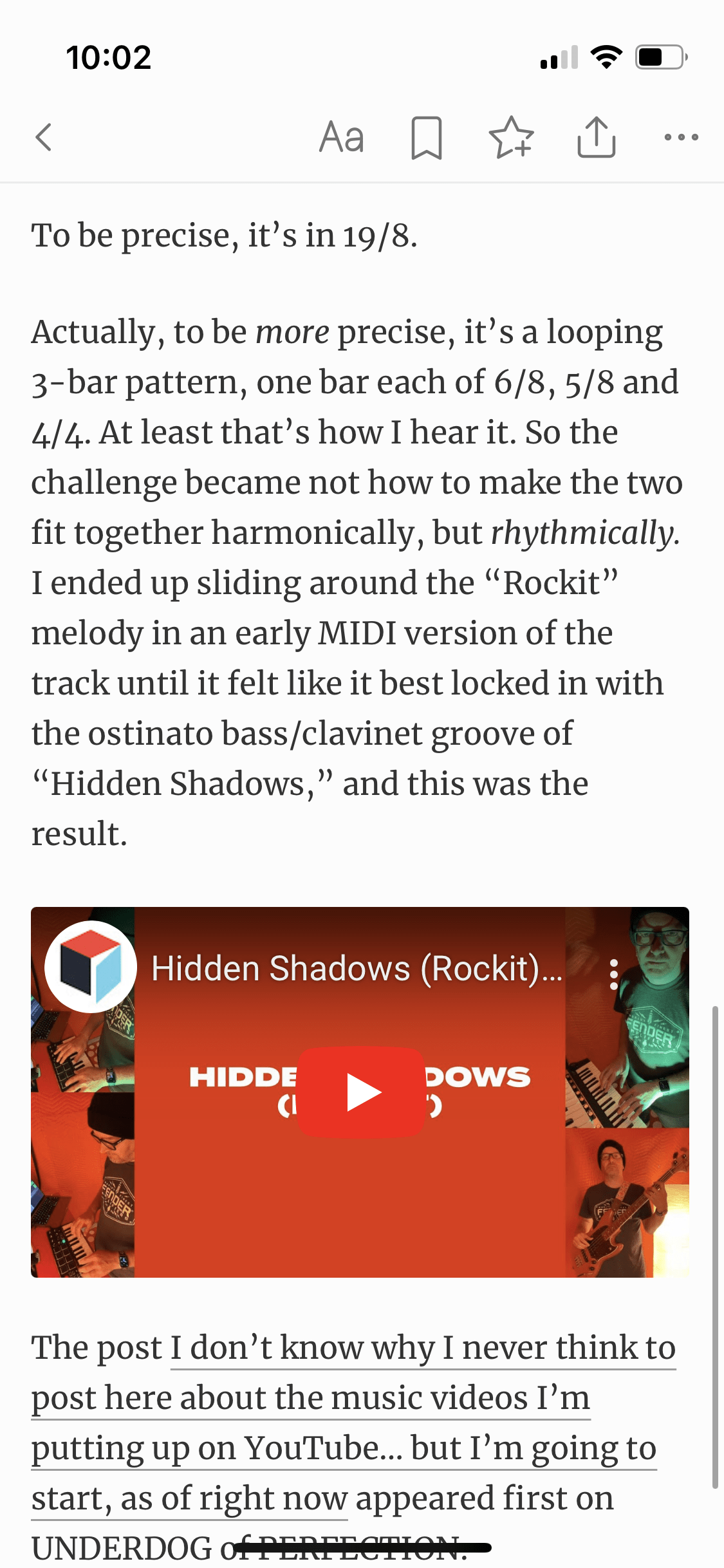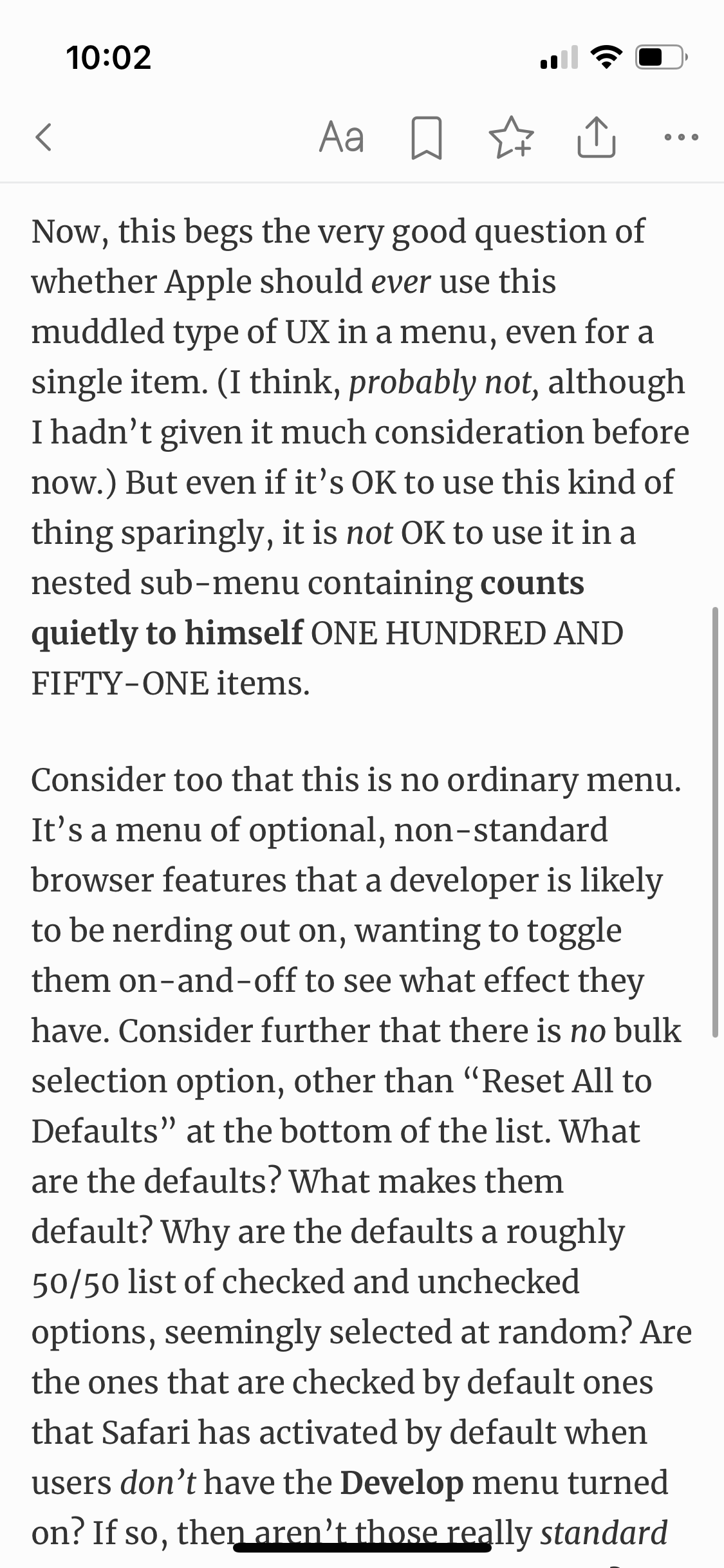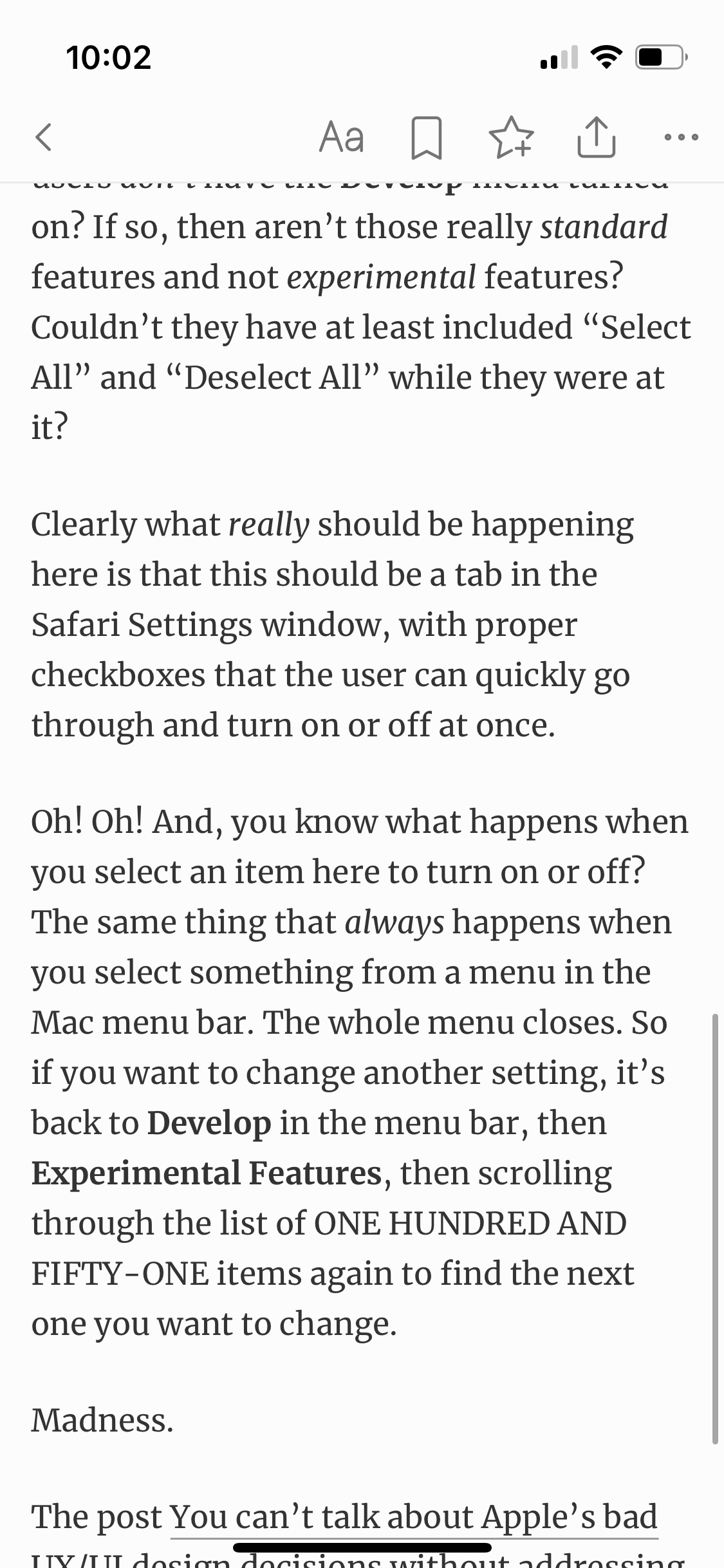And my cover of Herbie Hancock’s “Sly” is featured in the “Sex Ed” episode of the Risk! podcast.
I’ve also made a YouTube playlist of all of the videos from the album.
And my cover of Herbie Hancock’s “Sly” is featured in the “Sex Ed” episode of the Risk! podcast.
I’ve also made a YouTube playlist of all of the videos from the album.
A little over a week ago I did something really stupid. Today I took the final step in making amends for that error, which was ultimately the consequence of a questionable decision I made many years ago, to create an ad hoc WordPress multisite setup. That lowercase “m” is significant, and I hinted at it in the post I linked to above.
This was not a proper WordPress Multisite setup. I think that feature probably already existed at the time, although it may not have. This was my own concoction, created by adding a PHP switch to the wp-config.php file, telling it to use a different database and uploads directory depending on the domain name in the HTTP request. It allowed me to manage a number of my own and Sara’s websites with a single WordPress installation, but it was dangerous.
None of the sites “knew” about each other. That wasn’t really a problem, except when it came to managing themes and plugins. I always had to be careful to remember that just because my site wasn’t using a particular theme or plugin, didn’t mean one of Sara’s sites wasn’t… or even one of my own other sites in the setup.
I forgot about that little detail when I did my stupid thing a couple weeks ago. I deleted all of the themes my blog wasn’t using, forgetting that Sara was using many of them. In a panic to quickly restore the themes, I made matters worse by accidentally restoring the entire server from a 6-day-old backup, erasing all of the work Sara and I had done on our respective sites over the preceding week.
My “final step” in making amends was to at least remove my own sites from that setup, so it is now just running Sara’s sites. If you’re reading this, it means you’re seeing my blog in its new home. (Coincidentally, this is also facilitating my gradual transition away from Digital Ocean in favor of Linode for my hosting needs.) I also moved my John Coltrane and Adelia Haight McCormick sites, which were part of the same cockamamie arrangement.
One last thing that I didn’t think I’d be able to recover: I wrote two fairly substantial blog posts in that week, and I was pretty sure those were gone forever. But last night I discovered that the Feedly app on my iPhone still had them cached! I quickly snapped a series of screenshots so they wouldn’t be lost forever.
I had originally intended to retype them here, back dating them to their original post dates, to make it seem like they’d never been lost. But somehow it seems more fitting to just post those phone screenshots instead.
One of the posts hinged on a composite Mac screenshot I had taken from Safari, demonstrating its absurd Experimental Features menu, and that’s an image I still had on my Mac, so I’m including it below as well.
Enjoy.







Also worth noting here… this is my first post on this blog using the Block Editor, a.k.a. Gutenberg. I’ve finally accepted its inevitability. I’ll probably update the site to a new theme in 2023 as well… this one is a custom hack of Twenty Eleven, for cryin’ out loud!
…is not something you’re likely to get anytime soon.
I’ve written about strange places before, but few places on the planet are quite as strange (or so it would seem, from what little we, on the outside, know about it) as North Korea. And there are few places in North Korea as strange as its capital, Pyongyang. And… perhaps the strangest place in Pyongyang is the one that does not exist (or so I’m guessing the official line goes by now): the Ryugyong Hotel.
I’ll leave it to you to research all the details, but suffice to say it would have been something of a monstrosity, even if it hadn’t been a complete architectural disaster… or had at least been finished. As it is, it remains little more than a sagging, eerie pyramid towering over the city’s horizon. (It’s said to be visible from anywhere in the city.)
Damn Interesting has some… damn interesting things to say about it. Someone has even registered the domain name on the pretense of creating an official site. (Don’t bother clicking the ad on the page for reservations.) There is an intriguing picture on the bottom of the page though, showing what appears to be a sign on the construction site with a picture of what the hotel will/would look like when completed. If its concrete bulk were in fact concealed behind a seamless façade of mirrored glass as shown, it might actually look kind of cool. But still a bit… weird? creepy? ominous? You decide.
Another of my favorite blogs, The Shape of Days, has also covered the subject in detail. Ultimately though, I think you just need to see it for yourself:
I think the most interesting aspect of the video above is something I’d never been able to glimpse in any of the photos I’ve seen before: the large numbers painted on the side of the building, indicating the floors.
Of course, maybe we’ve all misunderstood the real purpose of the hotel. This CGI video would seem to suggest that Kim Jong Il is going to perhaps load up all of the party faithful in the hotel’s copious accommodations, and blast the entire population of the country off into space in search of a new home planet. (Of course, such a venture, even in a Communist country, would require considerable funding via international corporate sponsorship.)
Despite my insatiable curiosity about places like this, there is just about no possible way I would ever want to actually visit North Korea, so I’ll happily settle for doing so vicariously via a bolder soul’s travelogue. It’s a fascinating and detailed account (which I’ve just spent the last two hours reading) of a rare, brief (and yet, in the moment, seemingly interminable) American tourist’s visit to the strangest country on the planet.
I’ve always found the notion that the free market will naturally solve any pressing environmental problems ludicrous, but this light bulb joke puts it in succinct perspective.
I was not in attendance at this year’s Nobel Conference but I just read about a comment made by presenter Steven Chu:
How many free-market advocates does it take to change a light bulb?
None, because if there was a problem, the free market would have taken care of it.
In other words, it’s possible that just maybe the profit motive does not always coincide perfectly with what’s best for the world (shareholders notwithstanding).
Wired has published an excellent article on how creationists are exploiting general misunderstanding of the scientific term “theory”. There is copious evidence that the principles of evolution are sound: aside from the fact that dog breeding (not a “natural” process, but evolutionary nonetheless) is something most people, creationist or not, take for granted, we can observe evolution — as an incontrovertible fact — among species like bacteria that undergo rapid reproductive cycles.
The problem, as the article suggests, is not so much one of science as it is of language: the word “theory” means something much different (and much more specific) to a scientist than it does to the average person, and creationist activists are expertly employing this fact to their advantage.
For me the question still remains, for what advantage? There’s nothing about evolutionary theory that denies the existence of a creator. The only thing at risk is wholesale fundamentalist belief in the inerrant truth of the Bible, and if you can live with “inerrant truth” being rife with self-contradictions, you’re going to have a lot of trouble with science anyway. But that doesn’t mean it’s not true. But, meh, who needs science anyway? What has science done for the average person, anyway? (Don’t ask that question with your eyes open, unless you happen to be somewhere in the middle of untouched wilderness… completely naked and devoid of tools of any kind… and, uh, without a computer on which to read these words.)